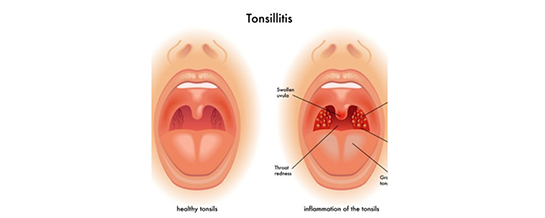How to Care for Your Child with Tonsillitis
This leaflet will provide you with information about tonsillitis symptoms, diagnosis, treatment, and prevention.

What is Tonsillitis?
Tonsillitis is a common infection in children that affects the tonsils. It can be caused by viruses and bacteria
What are the symptoms of Tonsillitis?
Your child may experience the following:
- Swelling
- Sore throat
- Swollen glands
- Difficult to swallow
- High temperature
- Runny nose and congestion
- Irritation or redness of the eyes
- Cough
- Hoarseness
- Skin rash
- Diarrhoea
How is Tonsillitis diagnosed?
The doctor will ask you a few questions about your child's health then examine your child. Your child doctor will decide if further investigation and blood test are required. Not all conditions require a blood test
How is Tonsillitis treated?
Supportive treatment is very important in treating Tonsillitis; please follow the below instructions:
- Make sure your child drinks plenty of fluids
- Make sure your child gets appropriate rest
- Avoid citric juices like orange; this can irritate the throat
- Offer your child hot /cold beverages or cold deserts; these will help relieve the pain and dryness of the throat
If your doctor advises giving medicine for pain and fever, you can give
- Paracetamol (or any other brand)
- Ibuprofen (or any other brand)
- Follow the instruction on the medicine package for the correct dose for your child
If antibiotics prescribed, make sure your child takes the antibiotics as advised and complete the course.
How is Tonsillitis prevented?
To prevent the spread of Tonsillitis infection, please ensure the following:
- Ensure that your child covers his/her mouth and nose when coughing or sneezing; use a tissue and dispose of immediately.
- If no tissues available, sneezing/coughing into the sleeve of one's clothing (at the inner elbow)
- Wash hand with water and soap after coughing or sneezing, or blowing his/her nose
- Use alcohol-based hand rubs if water and soap is not available
Home care advice
- Do not give Aspirin to your child as this can cause a serious complication
- For children over six years old, you can try gargling with salty water. Take 1/4 to 1/2 teaspoon of salt per cup (approximately 240 mL) of warm water; the water should be gargled and then spit out (not swallowed)
- Give liquids and soft food if your child finds it difficult to swallow
- Watch for signs of dehydration, dry mouth, reduced wet nappies, Lethargy
When should I seek medical advice?
Seek medical care if your child:
- Has a fever for more than three days
- Not getting better despite home care advice
- Has symptoms for more than seven days
- Appears dry and less energetic, no tears when crying
Go to the Emergency Department if your child:
- Has swelling in his neck or stiffness
- Has Difficulty in breathing
- Unable to drink any liquids
- Appears dry and producing less urine
- Has Difficulty in opening his mouth

